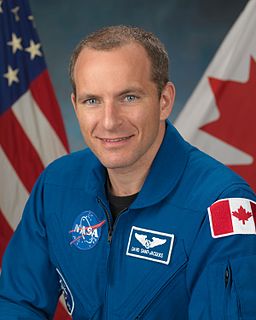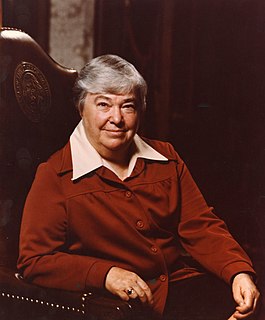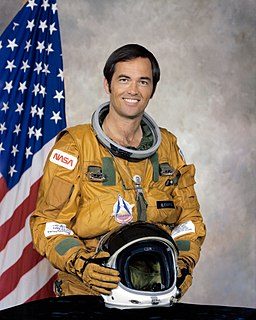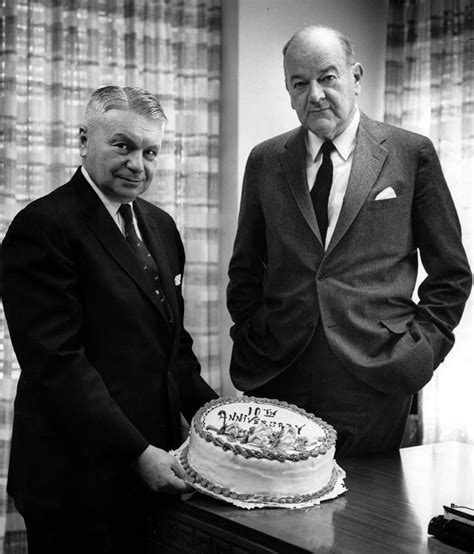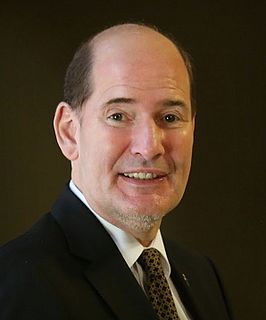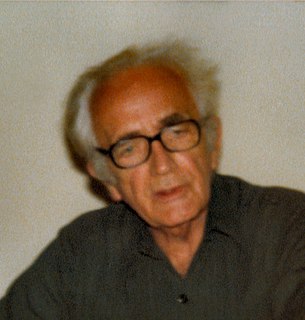Top 213 Astronauts Quotes & Sayings - Page 4
Explore popular Astronauts quotes.
Last updated on April 16, 2025.
When provoked, the itsy-bitsy invertebrates known as tardigrades can suspend their metabolism. In that state, they can survive temperatures of... 73 K for days on end, making them hardy enough to endure being stranded on Neptune. So the next time you need space travelers with the right stuff, you might want to choose yeast and tardigrades, and leave your astronauts, cosmonauts, and taikonauts at home.
Audiences of critical thinkers are my favorite kinds of audiences. There are jokes I tell in the show that don't get laughs unless I am in front of an audience of critical thinkers. Put me in front of a crowd of science teachers or astronauts! The guileless aren't our audience - it's the critical thinkers we love.
Space is our tool to take care of the world. From space, we know the Earth is fragile, and we can follow oil spills and forest fires, and monitor the environment and save it. The needs of remote communities and the needs of astronauts are similar. Canada is a country that is big and has a lot of people living in faraway places. Physicians in remote areas need to have contact with more senior colleagues. We depend on telehealth for advice, X-rays, labs. At the most simple technical level, space technology contributes to remote health care.
Half of one per cent of the U.S. budget is space-related stuff. In Canada, we spend more on dog foodScreen Shot 2015-08-19 at 2.39.35 PM. Space flight is intrinsically international and very modern. It's like a co-op. Every country provides services. In Canada, we have a focus on robotics in the shuttle and space station. In exchange, we get research time for our scientists and astronauts' flights. Our contribution is as a junior partner.
What keeps me up at night? Probably most, thinking about the future for my kids. It sounds kind of funny, but not so much what they're going to do, but how as a parent, how my wife and I as parents, how best we should prepare them for the world. And I know everybody does this, I think everybody stays up at night thinking about the best thing for their kids, and astronauts are no different.
It is through our technology that we have been able to fly far away from earth to learn, in truth, how precious it is. It is no coincidence that our awakening to the special nature of our world and to its uniquely balanced environment and its limitations coincided with our first glimpse of earth from outer space, through the eyes of astronauts, television cameras and photographic equipment.
The photographs of space taken by our astronauts have been published all over the place. But the eye is a much more dynamic mechanism than any camera or pictures. It's a more exciting view in person than looking at the photographs. Of course, I personally am sick and tired of hearing people talk like that: I want to see it myself!
A few years ago it dawned on me that everybody past a certain age ... pretty much constantly dreams of being able to escape from their lives. They don't want to be who they are any more. They want out. This list includes Thurston Howell the Third, Ann-Margret, the cat members of Rent, Václav Havel, space shuttle astronauts and Snuffleupagus. It's universal.
The United States, Russia, and China are the only three countries in the world that can launch astronauts into space. Mostly in the U.S. you see some companies trying to launch private commercial people into space, but nobody's done it yet. The only private vehicle that's made it into space so far is Spaceship 1 in 2004, and that was an effort that was funded by one of the Microsoft founders, and he spent about $20 million to develop this spacecraft to do a sub-orbital flight. And it's not the same as going into orbit, but it was a huge first step.
One Chief Astronaut used to make a point of phoning the front desk at the clinic where applicants are sent for medical testing, to find out which ones treated the staff well-and which ones stood out in a bad way. The nurses and clinic staff have seen a whole lot of astronauts over the years, and they know what the wrong stuff looks like. A person with a superiority complex might unwittingly, right there in the waiting room, quash his or her chances of ever going to space.
During the first few minutes in lift-off, the astronauts were strictly controlled and were powerfully buffeted by the forces of nature struggling to keep them on earth. This is somewhat comparable to the pull of the flesh when our alarm goes off early in the morning. Unless we put "mind over mattress" and carry out the resolves made the night before, we will experience our first defeat that day. Not sufficient to finish. Mission aborted.
Cooperating in something as visible as space exploration and space flight can only improve relations between the two countries because what happens is, you're working on a common project in a very visible light and so, you're motivated to not have conflicts with each other in other areas. And bringing up China is a good example. In the early '90's, China got serious about wanting to launch astronauts into space and they were actually quite successful in launching many communication satellites. They went ahead and in 2003 they launched their first astronaut into space.
Star Trek speaks to some basic human needs: that there is a tomorrow — it's not all going to be over with a big flash and a bomb; that the human race is improving; that we have things to be proud of as humans. No, ancient astronauts did not build the pyramids — human beings built them, because they're clever and they work hard. And Star Trek is about those things.
The powered flight took a total of about eight and a half minutes. It seemed to me it had gone by in a lash. We had gone from sitting still on the launch pad at the Kennedy Space Center to traveling at 17,500 miles an hour in that eight and a half minutes. It is still mind-boggling to me. I recall making some statement on the air-to-ground radio for the benefit of my fellow astronauts, who had also been in the program a long time, that it was well worth the wait.
To send humans back to the moon would not be advancing. It would be more than 50 years after the first moon landing when we got there, and we'd probably be welcomed by the Chinese. But we should return to the moon without astronauts and build, with robots, an international lunar base, so that we know how to build a base on Mars robotically.
In less than 70 hours, three astronauts will be launched on the flight of Apollo 8 from the Cape Kennedy Space Center on a research journey to circle the moon. This will involve known risks of great magnitude and probable risks which have not been foreseen. Apollo 8 has 5,600,000 parts and 1.5 million systems, subsystems and assemblies. With 99.9 percent reliability, we could expect 5,600 defects. Hence the striving for perfection and the use of redundancy which characterize the Apollo program.
My optimism and confidence come not from feeling I'm luckier than other mortals, and they sure don't come from visualizing victory. They're the result of a lifetime spent visualizing defeat and figuring out how to prevent it. Like most astronauts, I'm pretty sure that I can deal with what life throws at me because I've thought about what to do if things go wrong, as well as right. That's the power of negative thinking.
Where we're operating is orbital adventures. We would offer five to seven days in low Earth orbit aboard our own spacecraft where customers would have the view of the Earth; get to experience really living in space, probably conducting some scientific investigations that we would piggyback onto those flights. So, they would have the whole experience, kind of a mini-experience of what professional astronauts have.
The prerequisite that people have a scientific or engineering degree or a medical degree limits the number of female astronauts. Right now, still, we have about 20 per cent of people who have that prerequisite who are female. So hey, girls: Embrace the very fun career of science and technology. Look at computer science. That's what I did.
There are millions of people out there who would love to become astronauts, who'd love to go to space - they'd love to look back at this wonderful world from space. That will be the engine that will enable us then to develop spaceships to transport people around the world at tremendous speeds in an environmentally friendly way.
By 2025 we expect new spacecraft designed for long journeys to allow us to begin the first ever crewed missions beyond the Moon into deep space. So we'll start by sending astronauts to an asteroid for the first time in history. By the mid-2030s I believe we can send humans to orbit Mars and return them safely to Earth. And a landing on Mars will follow and I expect to be around in see it.
After investigating the UFO phenomenon all over the world, after studying thousands of pages of released government documents, and interviewing eyewitnesses and insiders, including generals, intelligence officers, cosmonauts and astronauts, military and commercial pilots, I do not have the shadow of a doubt anymore that we are indeed visited by extraterrestrial intelligences. The evidence just does not allow another conclusion.
As a youngster, I read of Buck Rogers and Flash Gordon. As a student, I wrote English reports on science fiction. And as a fighter pilot, I observed the selection of the Mercury astronauts. All this was fascinating, but I really didn't think I would ever be a part of it. It was only when my good friend Ed White was selected as a Gemini astronaut that I decided to join NASA as part of the Apollo program.
The dark dangerous forest is still there, my friends. Beyond the space of the astronauts and the astronomers, beyond the dark, tangled regions of Freudian and Jungian psychiatry, beyond the dubious psi-realms of Dr. Rhine, beyond the areas policed by the commissars and priests and motivations-research men, far, far beyond the mad, beat, half-hysterical laughter... the utterly unknown still is and the eerie and ghostly lurk, as much wrapped in mystery as ever.
[On Richard P. Feynman's live demonstration of the rigidity of the O-rings when cold that doomed the space shuttle Challenger, killing seven astronauts:] The public saw with their own eyes how science is done, how a great scientist thinks with his hands, how nature gives a clear answer when a scientist asks her a clear question.
Most astronauts are very down-to-earth people. Many of us, three-quarters, have an engineering degree, and we have a very Cartesian, rational approach to things. You don't go and get swept off your feet. That's not your job and that's not why you're hired. So if you get so mesmerized that you forget to do what you're supposed to do, whether it's to open the cargo door of the space shuttle or configure something inside, then you should not be there as a professional operator.
From space, astronauts can see people making love as a tiny speck of light. Not light, exactly, but a glow that could be confused for light - a coital radiance that takes generations to pour like honey through the darkness to the astronaut's eyes. In about one and a half centuries - after the lovers who made the glow will have long since been laid permanently on their backs - the metropolitan cities will be seen from space. They will glow all year. Smaller cities will also be seen, but with great difficulty. Towns will be virtually impossible to spot. Individual couples invisible.
I would require every producer of food to follow and have enforced a standard safety plan. We know how to produce safe food. It has a horrible name; it's called HACCP - Hazard Analysis and Critical Control Point - and this was a food safety system that was developed for NASA so that astronauts wouldn't get sick in outer space. If you just think about what it might be like to have food poison under conditions of zero gravity, you don't even want to think about it.
As far as Russia goes, they've been our partner for a long time now, since the early '90's. So you know, what's that, that's more than 15 years. And there have been times where things were a little tense, a little testy, but by and large, the partnership has been very successful. To give you two examples of that, when the Columbia accident occurred, the Russians supported us with their spacecraft faring our astronauts, including me, to the space station and also supplies.
While the astronauts, heroes forever, spent mere hours on the moon, I have remained in this new world for nearly thirty years. I know that my achievement is quite ordinary. I am not the only man to seek his fortune far from home, and certainly I am not the first. Still, there are times I am bewildered by each mile I have traveled, each meal I have eaten, each person I have known, each room in which I have slept. As ordinary as it all appears, there are times when it is beyond my imagination." (from "The Third and Final Continent")
In a big picture sense, it's more national prestige that we're risking. You know, we are proud of our space program, but as we were talking earlier, the average American doesn't think that much about it right now. So, it may seem like something we could just give up and not really worry about it, but I think it starts creeping into the national psyche. If American astronauts have to hitch rides with the Russians or other nations in the future.
Today, your cell phone has more computer power than all of NASA back in 1969, when it placed two astronauts on the moon. Video games, which consume enormous amounts of computer power to simulate 3-D situations, use more computer power than mainframe computers of the previous decade. The Sony PlayStation of today, which costs $300, has the power of a military supercomputer of 1997, which cost millions of dollars.
The Americans are still the leaders in human space flight. I feel we have a danger here of kind of stagnating. We're kind of resting on our laurels and there's a danger going forward if we don't take bold steps to really support human space flight in this country that we could fall behind. After the space shuttle is retired, we're going to have a big gap, five to seven years, at least where we're not going to have the ability to send our own astronauts into space, we'll have to buy rides on the Russian Soyuz, and so that will be a pretty big step down for us.


